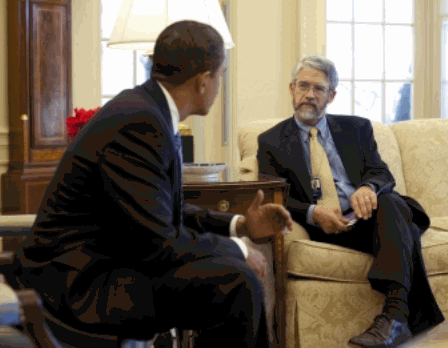|
|
|
|
|
|
|
News & Views item - May 2010 |
![]() Ask the President's Science Advisor. (May 24, 2010)
Ask the President's Science Advisor. (May 24, 2010)
 A
couple of weeks ago on the office of Science Technology Policy website the
following question appeared:
A
couple of weeks ago on the office of Science Technology Policy website the
following question appeared:
Would you like to know more about science and technology issues facing the Nation and the man advising the President on these matters? We’re not just talking about things you could learn in a textbook. This is about making science personal. Do you want Dr. Holdren’s opinion on, say, technological aspects of pop culture or the relevance of sci-fi? Is there a random query lumbering around in your head, the answer to which you absolutely must have directly from the President’s Science Advisor? Well, wait no longer, because this week OSTP is unveiling “Ask the President’s Science Advisor.”
And to take up the invitation you were told: "To ask a burning question of Dr. Holdren, send an e-mail to AskDrH@ostp.gov or tweet your short question to @whitehouseostp with hashtag #AskDrH. Dr. Holdren will select one query each week and answer it via a short blog post to appear every Friday, starting May 14."
Below is the first of the series. To access the one published on May 21 click here.
___________________________________________________
BjFreeman24: @whitehouseostp #AskDrH The university structure is killing science. Ego and bureaucracy override diverse, original ideas. What can be done?
While I don’t agree that the “university structure is killing science,” I do believe that federal research agencies and universities should always be looking for new ways to support diverse, original ideas. As part of his national innovation strategy, President Obama has asked federal agencies to increase their support for multidisciplinary research, early investigators, and high-risk, high-return research. For example, the National Institutes of Health (NIH) Pioneer and New Innovator awards provide support for creative researchers with ideas for projects that have the potential for unusually high impact.
The NIH and National Science Foundation have recently released a joint solicitation encouraging proposals at the intersection of biology and the physical sciences and engineering, in areas such as biological computing and biologically-inspired materials. Universities are also taking some important steps by allocating new faculty positions and lab space to support multidisciplinary research themes. OSTP welcomes suggestions for additional steps that the federal government should be taking to foster creativity and high-impact research.
John P. Holdren is Assistant to the President for Science and Technology and Director of the White House Office of Science and Technology Policy
________________________________________________
On May 28 "What Role Does Mentoring Play in Preparing New Scientists?"